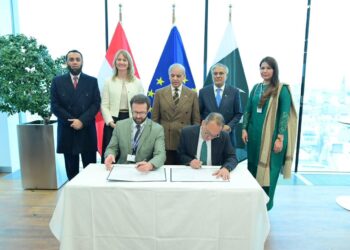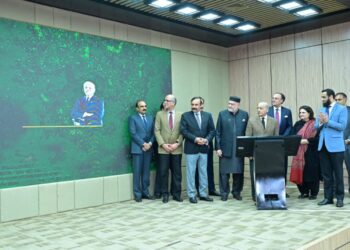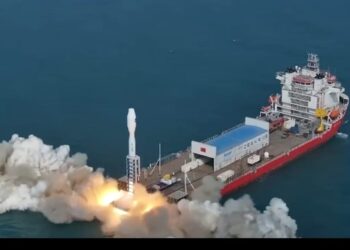Tehran, Iran :In a significant diplomatic development, Iran has signaled its willingness to resume nuclear talks with three key European countries—Britain, France, and Germany. These talks aim to revive dialogue over Iran’s controversial nuclear program, which has been the subject of global scrutiny and multilateral negotiations for over a decade.
According to Iranian media, the talks are expected to be held next week, although the exact time and location remain under discussion. This breakthrough was reported by Iran’s semi-official news agency, affiliated with the Islamic Revolutionary Guard Corps (IRGC), citing informed diplomatic sources.
Overview: Iran’s Agreement in Principle to Resume Nuclear Negotiations
Iran has reportedly reached an agreement in principle with the E3 nations (Britain, France, and Germany) to reengage in talks concerning the future of its nuclear program. These discussions come amid rising tensions, fears of nuclear proliferation, and increasing pressure from both the European Union and the United States.
Although Tehran has agreed to the talks to avert United Nations sanctions, it has simultaneously reiterated that it is unwilling to make concessions on the core elements of its nuclear development.
What Prompted Iran’s Return to the Negotiating Table?
1. Recent Attacks on Nuclear Facilities
The revival of diplomatic talks comes shortly after joint Israeli-American attacks on Iranian nuclear sites in June 2025, which significantly escalated tensions in the region. The attacks targeted multiple facilities suspected of uranium enrichment and nuclear weapon development, further deteriorating relations between Tehran and Washington.
As a result of these events, direct negotiations between Iran and the United States were suspended, causing a deadlock in international efforts to manage Iran’s nuclear ambitions.
2. Threat of UN Sanctions via the Snapback Mechanism
Iran’s return to negotiations appears to be, at least in part, a diplomatic maneuver to prevent the reimposition of United Nations sanctions. The E3 countries have reportedly been considering the activation of the “snapback mechanism”, a provision under the Joint Comprehensive Plan of Action (JCPOA), also known as the Iran nuclear deal of 2015.
This mechanism allows signatories to reimpose international sanctions on Iran if it is found to be in non-compliance with its nuclear obligations. The threat of such a diplomatic and economic setback has likely contributed to Iran’s calculated decision to resume discussions—though with caveats.
Background: Understanding the Iran Nuclear Deal (JCPOA)
What is the JCPOA?
The Joint Comprehensive Plan of Action, signed in July 2015, was a multilateral agreement between Iran and the P5+1 group of world powers—namely, the United States, the United Kingdom, France, Russia, China, and Germany. The deal aimed to:
- Restrict Iran’s nuclear program
- Limit uranium enrichment
- Allow IAEA inspections
- Lift international sanctions in return for compliance
Under the agreement, Iran committed to reducing its number of centrifuges, diluting its enriched uranium stockpile, and modifying the Arak heavy water reactor to prevent weapons-grade plutonium production.
The Trump Withdrawal and Collapse of JCPOA
In May 2018, then-U.S. President Donald Trump unilaterally withdrew from the JCPOA and reinstated severe sanctions under the “maximum pressure” campaign. In response, Iran gradually scaled back its commitments, enriching uranium beyond agreed limits and limiting international inspections.
Since then, international efforts to revive the JCPOA have been stalled repeatedly by political transitions, regional conflicts, and lack of trust between Iran and Western powers.
The Role of the E3 Nations
Britain, France, and Germany as Mediators
The E3 European nations have consistently acted as mediators and facilitators in the Iran nuclear negotiations. Despite the U.S. withdrawal from the JCPOA in 2018, these countries maintained diplomatic ties with Iran and advocated for the preservation of the deal through financial instruments like INSTEX (Instrument in Support of Trade Exchanges).
Their current efforts to reinitiate talks without direct U.S. involvement represent a strategic diplomatic move to:
- Prevent nuclear proliferation
- Avoid another Middle Eastern conflict
- Preserve the diplomatic legacy of JCPOA
Iran’s Firm Stance on Its Nuclear Program
Despite agreeing to talks, Iran remains defiant about its right to nuclear development, which it claims is for peaceful purposes such as energy production and medical research.
According to Iranian officials, Tehran will not tolerate any compromise that undermines its national sovereignty or technological independence. This firm position is expected to be a major sticking point in the upcoming discussions.
Iran has also accused Western powers of double standards, pointing to Israel’s undeclared nuclear arsenal and the failure of global powers to dismantle their own stockpiles.
Possible Outcomes of the Upcoming Talks
1. Temporary Suspension of Uranium Enrichment
One possible outcome is that Iran may agree to pause uranium enrichment activities in exchange for sanctions relief or humanitarian trade allowances. However, this will depend heavily on guarantees provided by European nations.
2. A New “JCPOA-lite” Agreement
Diplomatic experts believe a scaled-down version of the original JCPOA may be possible—one that focuses on short-term monitoring, confidence-building measures, and regional de-escalation.
3. Failure and Snapback Sanctions
If talks collapse or Iran refuses to accept minimal constraints, snapback sanctions could be enforced. This would further cripple Iran’s economy, isolate it diplomatically, and risk military escalation in the Gulf region.
Global Reactions and Stakeholders
United States
While not directly involved in these new talks, the Biden Administration has signaled support for any effort that might reduce nuclear tensions. However, following the June attacks, U.S.-Iran relations remain frozen.
Israel
Israel remains a staunch opponent of any nuclear deal with Iran. Israeli Prime Minister has warned that any agreement must ensure zero enrichment capacity for Iran, and the country reserves the right to take unilateral military action.
Russia and China
Both Moscow and Beijing have criticized Western sanctions and supported Iran’s right to peaceful nuclear energy. However, they have also urged Tehran to remain transparent and allow IAEA access.
Domestic Response Within Iran
Public opinion in Iran remains divided:
- Reformist groups favor diplomatic engagement to ease economic pressures.
- Hardliners argue that the West cannot be trusted and view the nuclear program as a symbol of national pride.
The Iranian government’s decision to enter talks without conceding ground reflects its attempt to balance domestic expectations with international diplomacy.
Final Thoughts: A Diplomatic Opening or Another Stalemate?
The announcement that Iran is prepared to resume nuclear talks with Europe’s E3 powers may offer a rare diplomatic opening in an otherwise tense global climate. However, deep mistrust, conflicting interests, and recent military escalations mean that the road to a comprehensive agreement remains uncertain.
With the snapback mechanism looming, and growing fears of a regional arms race, the world is watching closely to see whether diplomacy can once again steer the Iran nuclear issue away from the brink.

























